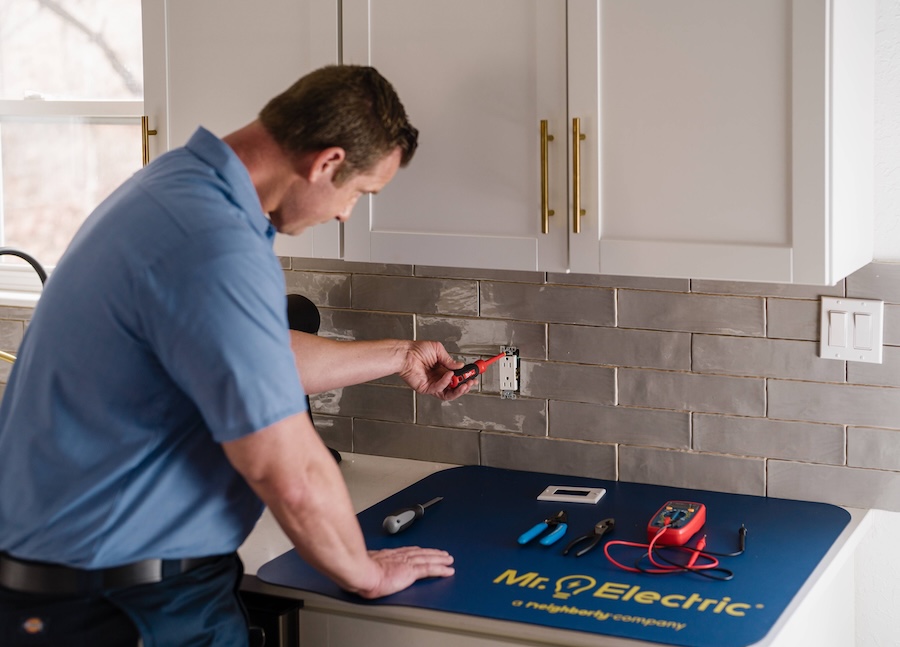Call This Sunday to Get 25$ OFF
24-Hour Emergency Electricians in San Antonio
Call this Sunday to Get 25$ OFF
Need an Electirician?
SCHEDULE SERVICE NOWCall Us Now
210-955-9600Call This Sunday to Get 25$ OFF
24-Hour Emergency Electricians in San Antonio
Call this Sunday to Get 25$ OFF
Need an Electirician?
SCHEDULE SERVICE NOWCall Us Now
210-955-9600
There are several different types of electrical outlets, each designed for specific purposes and parts of a building or home. Understanding the differences in these outlets can help you make the right choice and ensure electrical safety and efficiency. Whether you’re a new homeowner or someone who’s looking to learn more about their electrical system, it’s important to familiarize yourself with the different types of outlets commonly found in residential settings. It’s also advisable to work with a licensed electrician when you need help with electrical outlets.
In this article, Mr. Electric explains the different types of electrical outlets and what they’re used for. As a premier electrical service, we understand various components of an electrical system inside and out. Keep reading to learn all about the various types of electrical outlets and their applications in your home.
These are the most common outlets in U.S. homes. The 15-amp outlet has two vertical slots and a round grounding hole and is suitable for lights, TVs, computers, and small appliances. A 20-amp outlet looks similar but has a small horizontal slot, indicating it can handle larger loads like kitchen appliances, power tools, or window AC units. They're ideal for rooms where you expect higher energy demands.
GFCI outlets are designed to protect you from electrical shock, especially in areas with water. These outlets monitor the flow of electricity and shut off power if they detect a ground fault or imbalance. You'll find GFCIs in bathrooms, kitchens, laundry rooms, garages, and outdoor areas. They have “Test” and “Reset” buttons on the face. If your home lacks GFCIs in wet areas, call a licensed electrical service to undertake upgrades.
While GFCIs protect against electrical shock, AFCI outlets are designed to prevent electrical fires. They detect dangerous arcing and shut down power to prevent fire. AFCI protection is now required in many areas of new construction, especially in bedrooms and living rooms. These outlets help ensure your home stays safe from hidden wiring issues.
USB outlets combine traditional plug slots with built-in USB ports, allowing you to charge phones, tablets, and other devices without needing an adapter. They’re a great addition to kitchens, bedrooms, home offices, or anywhere you frequently charge electronics. Some models even include fast-charging technology for added convenience.
Used for high-powered appliances like electric dryers, ovens, water heaters, and central air units, 240-volt outlets are much larger than standard outlets and deliver double the power. These outlets are usually dedicated to one appliance and should only be installed by a licensed electrician due to the high voltage and safety requirements.
Smart outlets connect to your home’s Wi-Fi and allow you to control them remotely via a smartphone or smart home system. You can turn lights on or off, set timers, or monitor energy usage. Smart outlets are ideal for tech-savvy homeowners who want better control over their energy consumption and home automation.
If you’re considering installing electrical outlets in a new property and need help with choosing the right outlets, consult with the team at Mr. Electric. Our electricians specialize in electrical outlet replacement and repair in homes and businesses. If your outlets are in disrepair or are outdated, contact Mr. Electric for help. Our team has the expertise and experience to install, repair, or replace all types of electrical outlets, including standard outlets, GFCI outlets, AFCI outlets, and many more.